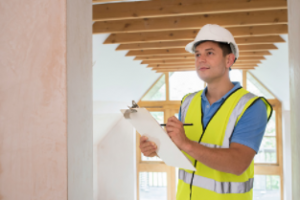A building inspector is employed either by a town, county or state and is qualified in one or several disciplines, entitling them to render expert judgment on whether a particular building satisfies current building codes. A building inspector will inspect structures ranging from residential homes to major corporations. In some cases, an inspector will inspect private residences. There are several types of building inspectors, including building Inspectors, Structural Inspectors, Environmental Inspectors, fire Inspectors, Energy Inspectors and Building Inspectors.
 If you need to find a building inspector to inspect your properties construction, then the first step you must do is search online for a qualified building inspector. Some websites even list the contact information of professionals in your area, allowing you to contact them directly. It is important to obtain the contact information of a building inspector well in advance of your construction project, as many tend to have a limited scope of activity. Most professional inspectors will require a written evaluation or report in writing. You should be prepared to provide additional information, either in the form of photographs or scanned images, to support your argument as to why your building’s construction should pass inspection.
If you need to find a building inspector to inspect your properties construction, then the first step you must do is search online for a qualified building inspector. Some websites even list the contact information of professionals in your area, allowing you to contact them directly. It is important to obtain the contact information of a building inspector well in advance of your construction project, as many tend to have a limited scope of activity. Most professional inspectors will require a written evaluation or report in writing. You should be prepared to provide additional information, either in the form of photographs or scanned images, to support your argument as to why your building’s construction should pass inspection.
The majority of building inspections are performed by structural engineers who licensed contractors, or building contractors employ. These individuals have received specialized training in the safe implementation of building codes and meet the requirements of local and federal governments. Although there is no magic formula for passing a building inspection, it is advisable to hire an individual who is highly trained in the building codes and an experienced contractor to perform the inspection. It may also be worthwhile to recruit the services of a structural engineer as they can assist in the inspection process by providing valuable tips on how to document and perform the necessary inspections properly.
Once you locate an experienced, qualified building inspector, you will want to arrange for the inspection to take place regularly. Most inspectors will require at least two weeks’ notice before conducting the inspection. It is important to provide the building inspector with specific instructions to avoid any problems during the inspection process. You should provide information regarding the type of building materials used in the construction, the methods used to install these materials, and the conditions under which the materials were installed.
Most inspectors require a history of the electrical systems in place. The inspector will most likely ask to review your building plans to determine whether or not your electrical system meets building codes. Suppose the electrical components of your system do not meet the current standards. In that case, you may be required to add additional electrical wiring or have your electrical service provider perform an electrical inspection and rework. Qualified electrical inspectors will often require that you supply power consumption records to ensure that your electrical system complies with electrical codes.